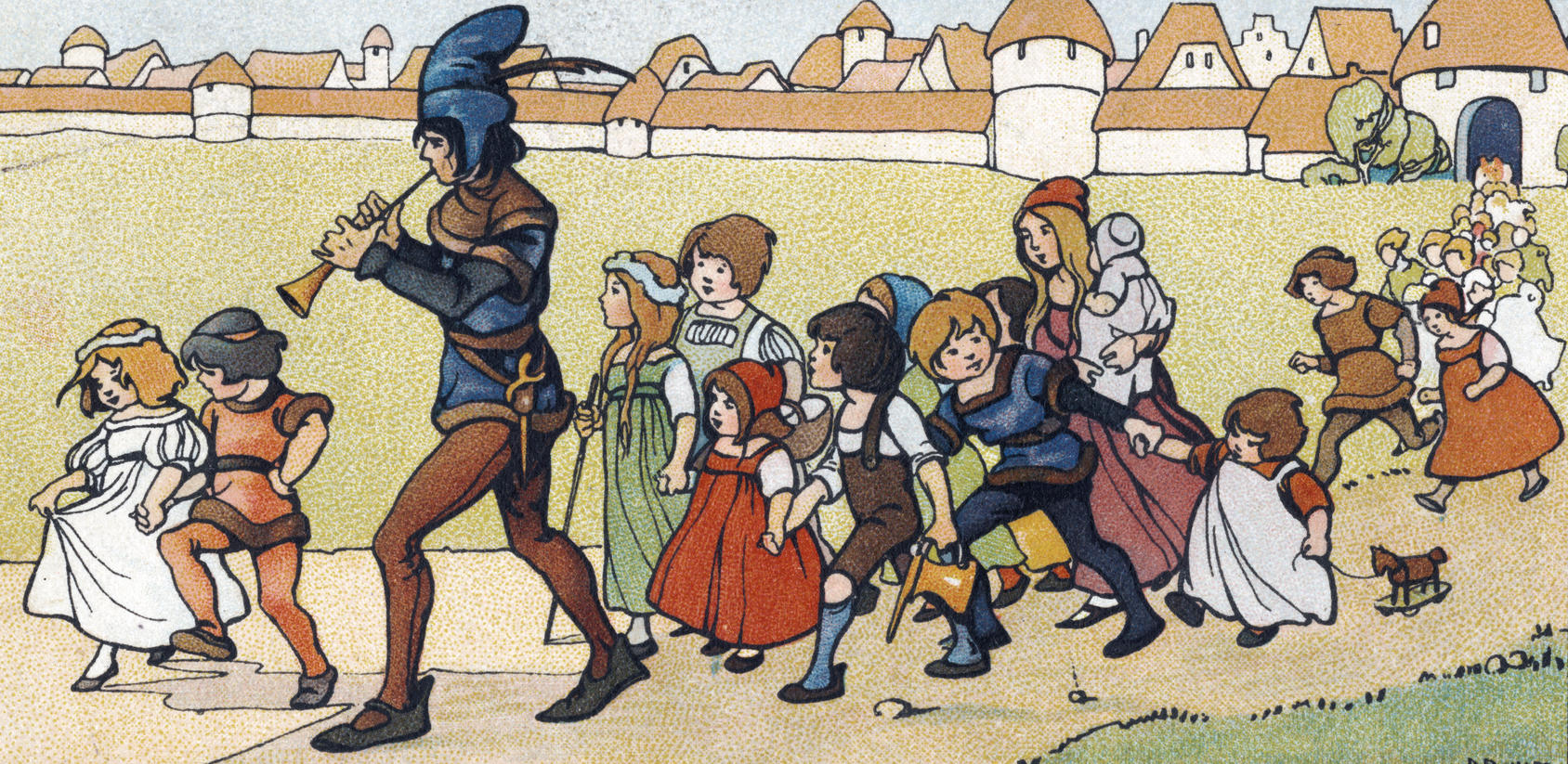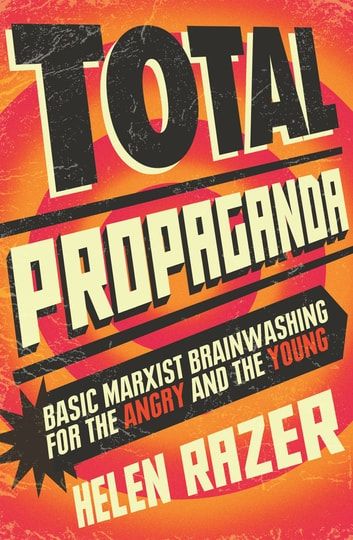Communism
Get ‘Em While They’re Young
This negative definition is a handy one, as it doesn’t commit her to any specific doctrines that have actually been historically implemented and shown to have failed.

A review of: Communism for Kids by Bini Adamczak, 2017, MIT Press and Total Propaganda: Basic Marxist Brainwashing for the Angry and the Young, by Helen Razer, 2017, Allen & Unwin.
A century after the Bolshevik Revolution, and a quarter-century after the collapse of the Soviet Union, somehow the Marxist dream is still alive and kicking. There are some who see the fading embers of communism not as a dark reminder of past horrors, but as an opportunity to usher in a new blaze. Keenly aware of millenials’ growing discontent with the status quo, they are reaching for the tinder-box.
German writer Bini Adamczak’s Communism for Kids is a paean for the ideology written in the form of a children’s story. As its translator into English noted in the New York Times, the book seeks to convey the virtues of communism in a much simpler way than is usually done by economists, political scientists and policy experts. This involves cute animations of a talking factory, whose obsession with producing more and more stuff makes its workers very unhappy indeed.
Total Propaganda is quite a different beast. The Australian writer Helen Razer has set out to persuade her ‘young and angry’ readers that Marxism contains the solutions to (almost) all of their economic and social woes. Razer peppers her sermon with fresh lingo designed to resonate with the Snapchattin’ and Instagrammin’ youth of today. With relatable chapter titles like: ‘OMG’! YOU ARE TOTALLY EXTRACTING PROFIT FROM MY BODY AND MY MIND! AND I ONLY JUST MET YOU ON THE TINDER BOOK!’ she hopes to dust off Marx’s ‘old spyglass’ to bring into focus the true evils of capitalism for the next generation.
Now, you might expect given the naiveté of their intended audiences, both texts would open strongly with clear definitions of what exactly this ‘communism’ thing is. Well, think again.
Adamczak opens early with ‘communism names the society that gets rid of all the evils we suffer under capitalism.’ This negative definition is a handy one, as it doesn’t commit her to any specific doctrines that have actually been historically implemented and shown to have failed. She can therefore repeat the common and convenient mantra that ‘communism has never existed in the entire history of humankind.’
Throughout the book, Adamczak’s staggering illiteracy of basic economic theory becomes increasingly apparent. This is the actual step-by-step account she provides of why capitalism necessarily always leads to its own destruction:
- Companies compete with each other by producing more products and reducing their prices.
- Most companies eventually can no longer compete, go bankrupt, and fire their workers, which increases unemployment.
- The surviving companies keep producing more products, assuming that future demand will always keep rising.
- But people can’t afford them, because of increasing unemployment.
- All companies eventually go bankrupt because no one can buy their products.
- Society is left with lots of excess products in a big heap that nobody can afford.
The (most) delusional parts of this story are steps (2) and (3). Regarding step (2), it is indeed true that companies do tend to go bankrupt if they can no longer compete. But as this is happening, the surviving companies will necessarily be growing in market share – and most likely taking on more employees. This means that unemployment won’t necessarily increase because companies are dropping out of the race.

Step (3) on the other hand assumes that companies don’t try to predict future demand for their product, which is laughably false. No sane CEO just slams on the accelerator, maximising output, without first considering if they’ll have enough customers to turn a profit.
Adamczak’s account of crisis in capitalism is so remarkably misguided that it suggests she has no genuine interest in accurately describing how capitalism really works. Hers is a made-up story, told to children, designed to scare them into believing there’s only one way to avoid the collapse of civilisation – the way of communism.
To be fair, the latter part of the book is dedicated to an immanent critique of the various attempts to implement ‘communism’ (note not real communism) throughout history. Adamczak lays out the pitfalls of corporate socialism, democratic workplaces, and the big one: centralised command and control of society’s resources. She then goes on to imagine future possibilities for a communist utopia. The first involves destroying all the factories and machines and reverting to a subsistence hunter-gatherer lifestyle, but her characters are quick to realise that this really, really sucks.
Adamczak then conjures up the opposite scenario: the technological automation of all human labour. In this world, people live gloriously hedonistic lives, while machines do all their work for them (it is left unspecified how exactly the Politburo would bring about these advances). Despite such abundance, however, people are apparently left unfulfilled, since they are no longer engaged in meaningful work projects with other citizens.
Exhausted from these trials of what they mistakenly thought communism to be, Adamczak’s characters eventually solve the problem. It turns out that the answer is simple:
Everyone should simply be able to do everything and live everywhere. If something seems bad or harmful, they can just change it. The people will decide collectively what they want and then see who wants to make it!
Fair enough. Though a couple of follow-up questions do come to mind.
Is this anarchism? It seems like an inconsistent fusion of anarcho-syndicalism and anarcho-capitalism – a kind of deformed intellectual love-child of Noam Chomsky and Murray Rothbard. As someone with an open mind for alternative modes of organising society, Adamczak’s aspirational words feel like a blank canvas where at least a sketch of a new idea should have been.

There is a similar lack of concrete policy proposals in Total Propaganda. Razer opts rather for longwinded diatribes about the messed up state of the world, basing much of her analysis on Marx’s theory of exploitation, and his related argument about the tendency of the rate of profit to fall.
The first big Marxist claim Razer unpacks is that workers in a capitalist society are always inherently exploited, because they always provide the company they work for with more value than they receive in wages. The theory states that this ‘surplus’ value, creamed off the top of workers’ labour, is unjustly appropriated by the company owners in the form of profit. Putting it bluntly, ‘to run at a profit,’ Razer exclaims, ‘is to short-change others.’
No reasonable economist takes this claim seriously. ‘Profit’ is simply revenue minus costs. If you’re not running at a profit, you are wastefully converting resources into a form that not enough people actually want or need. The real question for Marxists, which Razer conspicuously avoids answering in her 220 page tome, is what would constitute just compensation for workers’ efforts, if not the wages they actually receive? Let’s look at some alternatives.
Perhaps everyone involved in the production process should receive an equal share of the profits? This seems fair. But let’s say you’re working at a shoe factory. Should the employee at the stationary store down the road who sold you that paperclip that held the funding proposal documents together be paid an equal share of the shoe factory profits? What about the other employees of that store who supported her?
You can see how unworkable this proposal of ‘an equal share for any contribution to the final product’ quickly becomes. One reason capitalism works so well is that it clearly defines people’s tasks and compensation in the form of contracts – the terms of which are voluntarily agreed by all parties involved. This avoids fundamentally irresolvable arguments later over who really deserves what, which can easily descend into violence.
Another possibility is that the labourer at the shoe factory deserves to be paid at least as much as the owner, because the darn capitalist didn’t do any of the actual work! Cue the corporate fat cat smoking a cigar in his office with his feet up on a mahogany desk, while his workers are sweating it out on the factory floor below.
Marxists traditionally have a real blind spot for ‘cognitive’ work, and a fetish for good old fashioned manly wood-choppin’, elbow-greasin’ physical labour. In a typical company the ‘capitalist’ tends to put forward (and risk) the capital required upfront to buy the factory or raw materials, and then has to pay wages to employees long before any product is sold. This is not to mention the need to conduct research regarding the product’s design, as well as levels of market demand.
If the company in fact turns out to be profitable (which most companies do not!) the capitalist can end up earning more than their employees, because they took on all of the risk. Those who complain that workers don’t get paid enough of a company’s profits ought to also agree that those same workers should be jointly liable for the potentially huge costs if the company goes bankrupt. Any takers? Didn’t think so.
Michel Foucault said that Marxism exists in 19th century thought like a fish in water: that is, it is unable to breathe anywhere else. This is partly because Marx’s theory of exploitation is rooted firmly in this historical period in Britain, where there was obviously a serious oversupply of workers relative to the emerging opportunities to work in factories. In these circumstances, employers could indeed exploit workers by only offering them lousy working conditions, because there were hardly any alternatives.

But this type of exploitation is obviously not necessarily universal across all times and contexts. The Marxist attempt to derive a form of exploitation fundamentally intrinsic to capitalism is simply incoherent.
At one point Razer even acknowledges that the Marxist ‘labour theory of value,’ underpinning its notion of exploitation, is ‘one highly problematized idea.’ She admits that—
[O]rthodox Marxists, and even people like me who approach Marx in a more artsy fartsy way, have difficulty letting the idea of the surplus provided by the worker go.
You can sense here the looming doubt in the back of Razer’s mind. She knows she hasn’t critically examined one of the theoretical lynchpins of her whole ideology – but oh well – it does make for a good story.
The second big Marxist claim Razer depends on is that capitalism is doomed to collapse because of the tendency of the rate of profit to fall. This theory claims that the profit made by capitalists is derived exclusively from human labour, and therefore, as more machine automation is adopted, less human labour is needed, and so less profit can be made. This eventually means that capitalists’ profits shrink to zero, and the economy collapses.
However, as has been pointed out many times before, if the rate of productivity growth from technological automation is greater than the rate at which human labour is reduced, then the rate of profit can indeed stay constant or increase. And this is only considering matters from within a single industry. Just because the rate of profit is falling for, say, the cotton industry, does not mean it’s falling for the economy overall. Indeed, whole new industries are being created all the time, each demanding more human labour to grow.
The more fundamental point to make is that it is not actually human ‘labour’ that creates value at all, but rather human creativity. And there will always be a need for human creativity, because there will always be novel problems to solve, as our technologies and societies become increasingly advanced. No amount of machine automation has so far added up to genuine creativity, despite the hype you may have heard around the rapid progress of artificial intelligence. Computers can help us complete tasks far more efficiently than we could otherwise, but humans are still required to creatively recognise the important and relevant problems that ought to be tackled in the first place.
Put simply, the capitalist system of profit and loss is not going to self-destruct in the way that Marxists declare, because their economic theories don’t hold up to scrutiny. An interesting question follows: why haven’t Marxists given up? Why don’t they learn from trying and failing for so long (at least in the West) to rationally convince people of their ideas?
Here we finally arrive at the crucial Marxist notion of ‘historical materialism’. This is the idea that it is the economic system of a society that determines the dominant ideas of that society, and not the other way around.
Marx’s view was that the bourgeois values and beliefs so prevalent in a capitalist society were conditioned by the material circumstances that people found themselves in, rather than by ideas they had actually reflectively endorsed as valid and true.
This doctrine is fundamentally mistaken. It is always the dominant ideas of a society that determine the material living conditions of people in that society. For example, it was the radically transformative new ideas that emerged in Europe during what we call the Enlightenment that caused such a dramatic improvement in much of humanity’s material living conditions over the past few centuries. Conversely, anti-rational ideas (often positing fictional supernatural forces) restricted the growth of knowledge, and material progress, for millennia.
It is crucial however to recognise that despite being false, ‘historical materialism’ plays an important role in the ideology of communism. It accounts for the troublesome fact that people living in flourishing capitalist societies are generally very reluctant to sign up to the communist utopia. According to Marxists, this is not because they’ve thought for themselves, considered the arguments for communism, and dismissed them as absurd. No, they are simply victims of ‘false consciousness’ programmed into them while growing up in a capitalist society. Thus arises the urgent need for violent revolution to ‘free’ them against their wills, which has characterised so many past bloody attempts to implement communism.

But what follows the revolution? Once all of their incoherent theorising is stripped away, Marxists appear to be driven most strongly by a single moral principle. As Razer declares, ‘the only way to our collective freedom is through our true collective ownership of this world.’ That is, every person should possess an equal share of the total wealth, regardless of how much wealth they create or contribute.
Yet the Marxist principle of strict economic equality is fair and just in only an extremely narrow set of situations. For example, when a cake is being divided amongst friends, or when pocket money is being handed out to children for completing the very same task. More generally speaking, it’s applicable in zero sum situations (where new wealth is not being created), and where there is no rational basis for unequal distribution of resources.
Neither of these conditions hold true for a modern society, which makes applying the principle of economic equality writ large a reliable source of horrific outcomes. This is due to three main reasons.
Firstly, if everyone owns everything, no one is truly responsible for anything. Tremendous waste and degradation result because people do not have specifically allocated and defined property to take care of themselves. This is often referred to as the ‘tragedy of the commons’.
Secondly, if everyone owns everything, everyone needs permission from everyone to do anything. In order to use ‘society’s’ resources for your own speculative ends, you would need to get permission from everyone – or at least those who claim to represent everyone (i.e. the government). This is why so little innovation occurs in non-capitalist societies. Many of the most important intellectual and technological breakthroughs in history were thought by most people at the time to be unnecessary, impossible or evil. This was only proven otherwise via free experimentation that would never have occurred if first put to a majority vote.
Finally, if everyone owns everything, then only a small number of people with political power decide how resources can be used. This leads to a huge waste of wealth on the vanity projects and wars of emperors and dictators.
Perhaps the purest statement of what Marxists really want is captured in the following quote of Razer’s: ‘We seek a world in which the lives of each and all are unencumbered by too much work, too much alienation and too little time to lay about wondering what we each might like to do. ‘
Razer is literally asking for a constant stream of public funding to allow her to maximise her own interests. No wonder she hates capitalism. In a properly functioning capitalist economy, you can only get rich by satisfying the needs and desires of others. This is not to say that much waste and exploitation can’t happen under capitalism, but it does in theory set up a basically good incentive framework. The same cannot be said for communism.
In her epilogue, Adamczak expresses her hope that the ‘absurdity and unnecessary brutality of capitalist society will leap out to the people of future generations, the same way that the binary gender system or flatness of the earth seems crazy to us today.’ This is the frantic hope of a true believer in the grip of an utterly compelling hallucination. On some level she’s aware that her argument has failed, yet can’t help but see the world as outlined in her dreams, and wish it upon the rest of us.
Towards the end of her screed, Razer actually admits that she loathes the person who introduced her to the ‘headache’ that is Marx. Has she ever paused, I wonder, to consider if that throbbing pain is her brain’s natural response to trying to make sense of the nonsensical?






